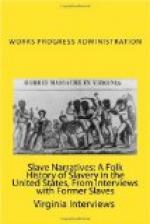REFERENCE
1. Personal interview with Patience Campbell, 910 Cherry Street, Monticello, Florida
FEDERAL WRITERS’ PROJECT American Guide, (Negro Writers’ Unit)
Rachel A. Austin, Field Worker
Jacksonville, Florida
November 20, 1936
FLORIDA CLAYTON
The life of Florida Clayton is interesting in that it illustrates the miscegenation prevalent during the days of slavery. Interesting also is the fact that Florida was not a slave even though she was a product of those turbulent days. Many years before her birth—March 1, 1854—Florida’s great grandfather, a white man, came to Tallahassee, Florida from Washington, District of Columbia, with his children whom he had by his Negro slave. On coming to Florida, he set all of his children free except one boy, Amos, who was sold to a Major Ward. For what reason this was done, no one knew. Florida, named for the state in which she was born, was one of seven children born to Charlotte Morris (colored) whose father was a white man and David Clayton (white).
Florida, in a retrogressive mood, can recall the “nigger hunters” and “nigger stealers” of her childhood days. Mr. Nimrod and Mr. Shehee, both white, specialized in catching runaway slaves with their trained bloodhounds. Her parents always warned her and her brothers and sisters to go in someone’s yard whenever they saw these men with their dogs lest the ferocious animals tear them to pieces. In regards to the “nigger stealers,” Florida tells of a covered wagon which used to come to Tallahassee at regular intervals and camp in some secluded spot. The children, attracted by the old wagon, would be eager to go near it, but they were always told that “Dry Head and Bloody Bones,” a ghost who didn’t like children, was in that wagon. It was not until later years that Florida and the other children learned that the driver of the wagon was a “nigger stealer” who stole children and took them to Georgia to sell at the slave markets.
When she was 11 years old, Florida saw the surrender of Tallahassee to the Yankees. Three years later she came to Jacksonville to live with her sister. She married but is now divorced after 12 years of marriage.
Three years ago she entered the Old Folks Home at 1627 Franklin Street to live.
1. Personal Interview with Florida Clayton, 1627 Franklin Street, Jacksonville, Florida
FEDERAL WRITERS’ PROJECT American Guide, (Negro Writers’ Unit)
Viola B. Muse, Field Worker
Jacksonville, Florida
December 3, 1936
“Father” Charles Coates
“Father” Charles Coates, as he is called by all who know him, was born a slave, 108 years ago at Richmond, Virginia, on the plantation of a man named L’Angle. His early boyhood days was spent on the L’Angle place filled with duties such as minding hogs, cows, bringing in wood and such light work. His wearing apparel consisted of one garment, a shirt made to reach below the knees and with three-quarter sleeves. He wore no shoes until he was a man past 20 years of age.




